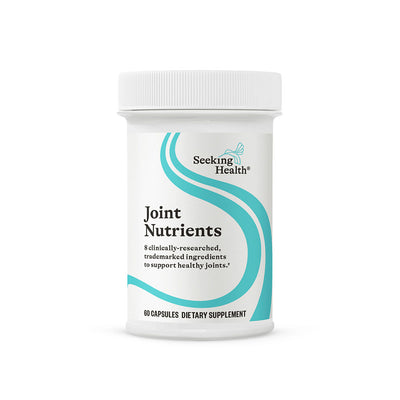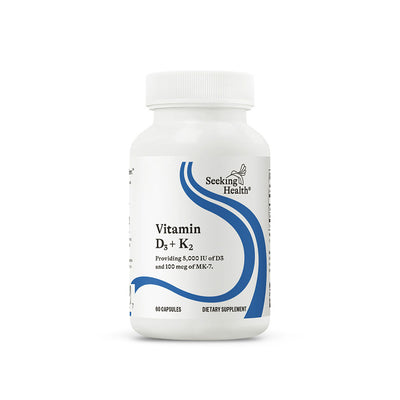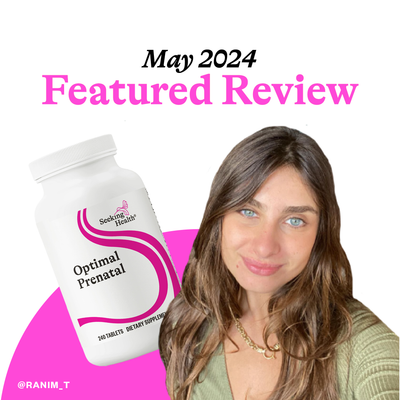As with most things, not all supplements are created equal.
What’s in your supplement bottle? Does it match what’s printed on the product label?
Are you confident that you’re taking what is stated in the supplements facts panel?
Have your supplements been third-party tested for purity and potency?
Are you taking certified products?
Are you getting what you’re paying for?
These simple questions can be challenging to answer, especially when a supplement company is not transparent about their internal processes.
Here at Seeking Health, we are committed to providing you the best in bioavailable supplements, methylation support, prenatal vitamins, genetic analysis tools, and more.
We go to great lengths to ensure that you get exactly what is printed on your supplement label.
In this article, I will explain all of the ways we test your supplements and ensure that our contract manufacturers are testing the individual raw ingredients as well.
As the Quality Control and Regulatory Manager at Seeking Health, my department’s responsibility is to oversee these testing processes. If you ever have any questions, please don’t hesitate to reach out to us at customer@seekinghealth.com.

FDA Dietary Supplement Regulations
Supplements are regulated by the Food and Drug Administration (FDA) as food, not as drugs. While supplements can only contain ingredients that the FDA has considered GRAS (Generally Recognized As Safe), federal laws do not specifically require dietary supplements to be proven safe to FDA's satisfaction before they are marketed. The FDA recommends ensuring a supplement is safe before taking it, but how are you supposed to know this? (1)
High-Quality Supplements
Here at Seeking Health, we take your health very seriously. Our founder, Dr. Ben Lynch, is genuinely passionate about sourcing the highest quality ingredients we can find. He founded Seeking Health over a decade ago because the supplements he saw on the market were lacking in a variety of ways. They lacked potency, purity, and effectiveness. He created Seeking Health as a solution to help people achieve their goals faster, with less guesswork, and more confidence in choosing the best supplement for their situation. Ultimately, Dr. Lynch wants you to be empowered in your own health, which starts with understanding how to find and choose the best supplements for you.
When you’re shopping for supplements, it’s critical to choose a company that is transparent about its internal procedures, and that you are confident is providing you a high-quality product.
At Seeking Health, we do not sacrifice quality for profit.
We strive to go above and beyond the average supplement company, which is why we allocate significant resources to testing all of our supplements for purity, potency, and label claims.
In this article, I’ll share ten ways that we test your supplements here at Seeking Health.

10 Ways We Test Your Supplements
With supplements, it can be scary because you never know exactly what you are getting. That’s why it’s essential to choose a trustworthy, reputable brand that is prioritizing quality over the bottom line. While this can be rare to find these days, Seeking Health is proud to go to great lengths to ensure your supplements are pure, free from contaminants, and that you are getting precisely what is stated on the product label. Here are ten ways we test your supplements to make sure you’re getting the quality you are paying for.
![[Infographic]-10-Ways-We-Test-Your-Supplements](https://cdn.shopify.com/s/files/1/0010/0250/4310/files/Infographic-10-Ways-We-Test-Your-Supplements.jpg)
1. Shelf-Life Testing
Dietary supplements can be marked with either a manufacture date (MFG) or an expiration/best by date (EXP). For a consumer, it’s more helpful to know the date a supplement expires rather than the date it was manufactured. Shelf-life testing allows supplement companies to print an EXP date on the bottle.
What’s the difference between MFG and EXP dates? And why does it matter?
Products marked with an MFG date can guarantee that the product met all nutrient claims on the label at the time of manufacture. However, an MFG date does not guarantee that the product label claim will be met for any specified period of time.
An EXP date guarantees the product’s potency for a designated period of time, ensuring that the product meets the label claim until the EXP date stated. EXP dating gives you extra assurance that the product retains its potency for the stated shelf life.
An EXP date is only permitted if there are actual test results to back up the shelf-life claim.
2. Shipping Studies
Here at Seeking Health, we test certain products to gather information about how high-heat environments affect temperature-sensitive products. This sort of testing allows us to ship products in a way that is conducive to maintaining their potency, whether this is with an icepack, expedited shipping, or without an icepack and regular shipping.
Shipping studies help ensure that your products retain their potency during travel.
During a “Shipping Study,” products are stored in a chamber where they are exposed to high heat and high humidity that mimics the conditions that would be found in a shipping trailer for six days, which is representative of a long shipping interval. Throughout those six days, products are tested for label claim and viability, microbial growth, and product integrity. This ensures that we can select the correct shipping conditions for heat-sensitive products (such as probiotics) so that they remain viable during their journey from the manufacturer to you, the customer.
3. Other Contaminants
We test for “other” contaminants as needed. For example, we have tested for phthalates in our prenatal products and rancidity in our olive oil-based products.
We test for these things for several reasons:
- When we have a reason to believe that there is possible contamination
- When there is a common issue with a specific ingredient (i.e. olive oil is prone to rancidity over time)
- When common adulterants have been identified for an ingredient (i.e. pesticides and certain herbs or botanicals)
- A customer complaint warrants further investigation
Quality is important to us. We are committed to providing you with pure products that you can feel confident about using and sharing with your family.
4. Additional Product Testing
We conduct additional product testing as needed or when enough customers ask the same question. For example, we have conducted a study on the efficacy of our Lactase Drops. This study found the product to be effective as labeled: Adding seven drops per pint of milk resulted in 23.1 percent relative lactose hydrolysis.
We have also conducted studies looking at Histamine Levels in our Optimal Electrolyte. No histamines were found in any of our electrolyte products.
5. Label Claim Verification
All of our products undergo label claim verification to ensure that nutrient claims on labels are met. This means that if the labeling says that there is 500 mg of vitamin C, there will be at least 500 mg of vitamin C in the product.
Dietary supplement products are typically formulated with adequate overage so that label claims can be met through the product’s entire shelf life (if it is marked with an EXP date). Thus, a more recently manufactured product may be slightly over the advertised label claim.
Some ingredients are difficult to test for in a finished product due to testing interference with other ingredients and/or the amount of the ingredient relative to the total formulation. When a valid test method cannot be used to test for label claim, we refer to the manufacturing batch records, raw material testing, and qualification documents to ensure the proper amount of ingredient was put in. This form of label claim verification is often called verification by input.
6. Microbial Testing
Microbial testing is done on all products to ensure they are free of microbial contamination at the time of manufacture.
We test for the following sources of potential contamination:
- Total plate count (which measures the number of viable microorganism cells in the sample)
- Yeast and mold
- Bacteria
- E.Coli
- Salmonella
- Staphyloccous Aureus
We have identified these as the most common potential microbial contaminants and have strict standards for our test results based on each product’s characteristics.
7. Heavy Metal Testing
We test for heavy metals in all of our products.
Heavy metal testing ensures that products never exceed FDA maximums, meet our heavy metal specifications, and can be appropriately labeled for Prop 65 if needed.
We test for the following heavy metals, which are commonly found in dietary supplements:
- Arsenic
- Lead
- Mercury
- Cadmium
8. Allergen Testing
Allergen testing ensures that products are free of allergens or labeled appropriately.
Our manufacturers have separation measures in place to prevent contamination from allergen-containing ingredients. We test products from all of our manufacturers to ensure that their protective measures are adequate.
We test for the following allergens:
- Milk
- Egg
- Fish
- Shellfish
- Tree nuts
- Peanuts
- Wheat
- Soybeans
9. GMO Testing
We test for the presence of GMO markers as a part of our allergen verification program. Our GMO testing looks for GMO DNA markers.
We work with an independent laboratory that is ISO/IEC 17025 accredited. ISO 17025 accredited laboratories have demonstrated that they are technically proficient. They are able to produce precise and accurate test and calibration data and also undergo regular audit and recertification processes.
Our laboratory uses cutting-edge DNA sequencing technology to identify GMOs – one of the only labs in the US using this technology.
This third-party testing identifies specific markers present on genetically modified organisms, thus confirming whether or not genetically modified DNA is present in the product. While we work to source organic (non-GMO) ingredients, this is not possible for all ingredients. It is also possible that some dietary ingredients may be originally sourced from a GMO plant, but that the genetically modified DNA is no longer present in the ingredient due to processing.
10. Certification Programs
Some products can be individually certified by third-party certification programs based on specific criteria. Here are a few examples of third-party certifications that we hold.
IFOS
Our Optimal Fish Oil is third-party tested by a certifying body, Nutrasource, to ensure that these products meet IFOS (International Fish Oil Standards) standards for labeling claims, contaminants, and freshness.
The IFOS tests products for the highest quality, safety, and purity standards in the world.
IFOS certifies that the amount of omega-3 in the product matches the label, that the fish oil has not gone bad (oxidized), and that the product contains the lowest levels of contaminants.

Consumer Labs Certification
We are in the process of pursuing Consumer Labs Certification on select products. This is a popular online consumer database where you can search for various products that have been through a rigorous testing protocol. At this time, our Lactase Drops, Active B12 with L-5-MTHF, and Vitamin D Drops are certified through this program.
Why is cGMP Important?
Companies that are cGMP (Current Good Manufacturing Practices) certified have strict qualification processes for sourced raw ingredients. This means when the raw ingredient is received, it is tested to verify that its identity and potency are correct and it is not contaminated.
Seeking Health only partners with manufacturers that hold a current cGMP certification.
NSF International (National Sanitation Foundation) is the company that issues our GMP certification. Our GMP certification covers the facility and the operations within our facility. All of our contract manufacturers are GMP certified as well.
The NSF audits us annually for compliance. This entails a rigorous onsite audit where they thoroughly check out our facility, documents, and internal and external procedures for meeting GMP compliance. We also perform regular “internal audits” to maintain NSF standards every day of the year.

The Bottom Line
When you’re shopping for supplements, it’s important to ensure that you’re choosing a reputable brand that tests its products for purity, potency, and label claims. Because the FDA does not regulate many aspects of supplement manufacturing, you should seek out companies that are transparent about their internal manufacturing processes.
Here at Seeking Health, we go to great lengths to test your supplements to ensure you are getting exactly what is stated on the label
We test your products for identity, potency, purity, and more. Our founder, Dr. Ben Lynch, is genuinely passionate about providing you with the highest-quality ingredients and formulations that are available. At Seeking Health, we do not sacrifice quality for profit. That’s why you should feel great about choosing Seeking Health supplements.
Shop Seeking Health Supplements here.












